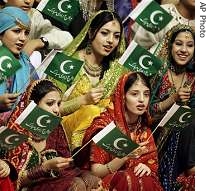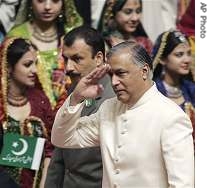2007年VOA标准英语-60th Anniversary of Independence Finds Pakistan(在线收听)
Islamabad
14 August 2007
Pakistan is celebrating its 60-year anniversary Tuesday. People have taken to the streets throughout the country to commemorate the Islamic republic's creation in 1947. However, VOA's Benjamin Sand reports from Islamabad that the celebrations have been bittersweet, as the country grapples with an uncertain future.

Pakistani girls wave national flags at a flag hoisting ceremony in Islamabad, 14 Aug 2007
The Pakistani national anthem plays during a special assembly in Islamabad.
Prime Minister Shaukat Aziz was there to raise the country's green and white flag and help inaugurate the celebration.
In a televised address, the prime minister paid tribute to Pakistan's progress since 1947. But in fact, the country has stumbled both politically and economically over the past 60 years. It ranks as one of the poorest nations in the world and, still lacks a functioning democracy.
One of the few areas in which Pakistan is on a par with its neighbor and rival, India, is the development of nuclear weapons. During his speech, Mr. Aziz singled out the country's nuclear program as a particular source of pride.
|
|
| Pakistan's PM Shaukat Aziz salutes as he arrives to hoist a national flag to mark the 60th anniversary of independence from British rule, in Islamabad, 14 Aug 2007 |
The evil eye does appear to be at work here, however.
President Pervez Musharraf, who first took power in a military coup in 1999, is under siege. His refusal to give up the rank of general is a divisive political issue.
National elections are expected before December, and the president is seeking another five-year term in office. But religious hard-liners are gaining political ground, and the president's hold on power is in question.
Pro-democracy forces are also on the move, pressuring Mr. Musharraf from the left. The Supreme Court has reasserted its political independence, and has issued a series of rulings against his government.
Islamic militants have unleashed attacks throughout much of the country, killing hundreds, while Al-Qaida fighters thought to be hiding out in Pakistan's remote tribal areas are vowing to overthrow the Musharraf government by force.
The United States still stands publicly by Mr. Musharraf, whom it considers one of its key allies in the struggle against terrorism. But U.S. officials have begun questioning whether he can and is doing all he could to fight Islamic militancy.
Analysts say the next few months could determine Pakistan's fate for years to come.
During an address to the nation Monday night, the embattled president defended his record.
He says Pakistan, and especially the economy, is stronger than ever. He says the government is working to reduce poverty and improve living conditions.
The president is himself a product of Pakistan's volatile history.
He was born in the Indian capital, New Delhi. When Pakistan and a new India were created out of British India in 1947, he and his family fled to the new Islamic republic through the bloodshed that consumed the sub-continent during partition.
Sixty years after it was created in violence, Pakistan is again experiencing a period of intense and bloody upheaval.
